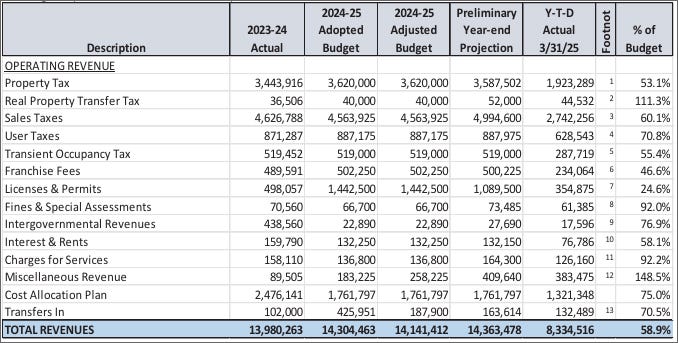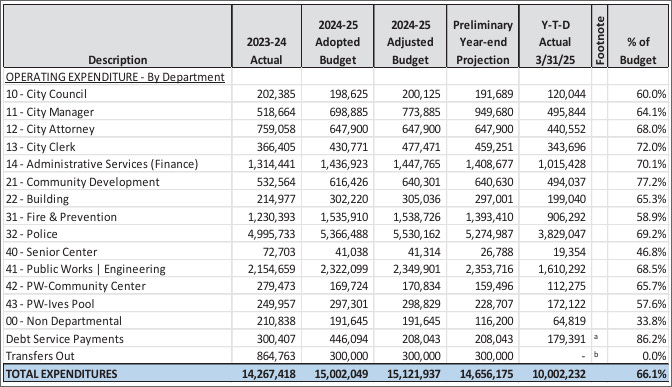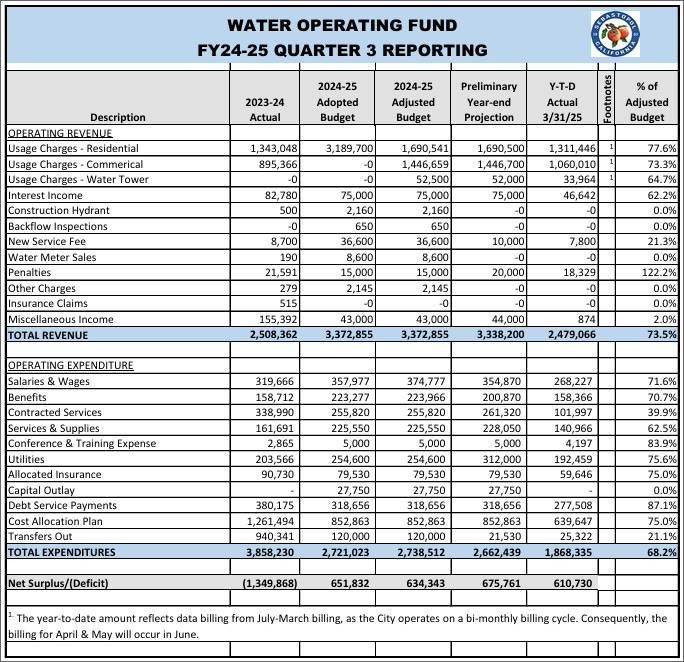Recap of the May 6 City Council Meeting
An interesting, if not particularly productive, meeting
Much of this meeting was devoted to discussion of requests from government associations, including the Sonoma County Mayors and Councilmembers Association and Cal Cities. In addition, the council denied the Gravenstein Apple Fair’s request for a waiver for the cost of police protection and failed to pass a request, coming from the Agenda Review committee, for a longer summer recess for the council.
Mayor Stephen Zollman, Vice Mayor Jill McLewis, Councilmember Neysa Hinton, and Councilmember Sandra Maurer were present for the May 6 Sebastopol City Council meeting. Councilmember Phill Carter was absent
Proclamations
The council made the following proclamations:
Proclamation proclaiming Municipal Clerks Week, May 4-10, 2025.
Proclamation proclaiming National Police Week, May 11 – 17, 2025.
Proclamation proclaiming May 2025 as Bike Month and May 15, 2025, as Bike to Work Day in Sebastopol.
Proclamation proclaiming National Public Works Week, May 18-24, 2025.
Public Comment
Eris Weaver of the Sonoma County Bicycle Coalition reminded everyone that this month is bike month and that Bike to Work Day is Thursday, May 15. She said there will be two Morning Energizer Stations in Sebastopol on Bike to Work Day: one at the entrance to the Joe Rodota Trail on Petaluma Avenue and another at Community Market, 6762 Sebastopol Ave.
Linda Robinett suggested that the Senior Center should move into the RiteAid building on Main Street. She noted that the shelves in the Rite Aid were getting pretty empty, and she wondered what was up with that.
Consent Calendar
The consent calendar consists of items that are routine in nature or don’t require additional discussion, often because they’ve been discussed extensively at a previous council meeting.
The council approved the purchase of a replacement patrol vehicle for the police, for $90,000, using the Police Endowment Fund.
The council approved revisions to the city’s publicly available pay schedule (See explanation and full schedule here.)
The council approved a resolution to submit applications for all CalRecycle grant and payment programs for which the City of Sebastopol is eligible.
The council gave its final approval of the Barlow Hotel Development Agreement. (Councilmember McLewis recused herself from this last vote because her business, Eye Candy, is right across the street.)
Informational/Presentations
Report on the most recent Sister City visit to Takeo, Japan
Meg Mizutani about Sebastopol World Friends’ most recent visit to Takeo, Japan, Sebastopol’s Sister City. Meg noted that the program had been running for so long that they were now seeing second-generation students: student ambassadors whose parents had been student ambassadors when they were teens. After her presentation, a group of teens who’d made the trip to Japan stood up to speak about their universally positive experiences.
Councilmember Jill McLewis, who went to Japan with the group, also expressed her appreciation for the experience. “I just truly appreciated that I was able to participate,” she said. “I don't think you really understand it until you’re actually there and you’re with the people…I just want to say how special this is. So if anyone ever has the opportunity, it’s truly a rewarding, unforgettable thing.”
Third Quarter Report on the General Fund
This quarterly report on the General Fund shows how actual revenues and expenses are tracking those in the adopted and adjusted budgets for fiscal year 2024-25.
Administrative Services Director Ana Kwong, who gave the presentation, is predicting a much smaller budget deficit than originally expected: $293,000 instead of $698,000. This improvement stems largely from the addition of $375,000 in estimated revenue from Measure U (sales tax), the movement of $238,000 in lease payments for a fire engine out of the General Fund and into the Measure H (fire tax) fund, and some unfilled staff positions. See the full staff report here.
Third Quarter Report on the Enterprise Funds: Water and Sewer
These quarterly reports show how actual revenues and expenses are tracking the budgets for water and sewer in fiscal year 2024-25. The staff report credits the balanced budget for water and sewer to the increased water and sewer rates that went into effect last year. See the full staff report here.
Regular Agenda
Three goals for regional cooperation
The Sonoma County Mayors and Councilmembers asked local cities to provide a list of their top three priorities for regional collaboration and discussion with the Sonoma County Board of Supervisors.
Vice Mayor McLewis chose economic development, shared facilities funding, and homeless funding; Councilmember Maurer chose homelessness, economic diversification, and grants; Councilmember Hinton chose homeless funding, library funding, economic development and SCTA bus service funding. Mayor Zollman chose library funding, shared facilities funding, homelessness funding, and CERT Training.
Shared facilities funding refers to two things: The fact that some services funded by the city are also used by west county residents who live outside city limits has led some to suggest that the county should subsidize some of these services. Shared facilities can also refer to the idea of local non-profits sharing facilities.
In the end, City Clerk Mary Gourley winnowed this down and came up with the three topics that Sebastopol will be submitting to the Sonoma County Mayors and Councilmembers Association:
homeless funding
shared facilities funding
economic development
The council approved these, voting 4 in favor, 0 opposed.
Council declines the Gravenstein Apple Fair’s request to waive funding for police services during the fair
The Gravenstein Apple Fair requested that the city waive the cost of providing police support for the fair, which amounts to $2957.64. Councilmember Maurer supported this proposal, but the other three councilmembers present went thumbs down on this one.
Councilmember Hinton noted that the fair was actually outside the city and that the fair has a lot of sponsorships. Vice Mayor McLewis said that, because it’s outside of town, the city doesn’t receive any tax money, that business at local stores and restaurants are actually slow during the fair, and that Farm Trails should expect security to be part of their regular expenses. Mayor Zollman noted that the city is still in fiscal emergency. Hinton made a motion to deny the Fair’s request for a $2957.64 waiver for the police services. The council voted 3 in favor of that denial and one opposed (Maurer).
Cal Cities legislative update
The council also voted to support CalCities’ suggestions supporting or opposing several bills in the state legislature. This item offered a unique opportunity for a council to see what the state legislators were up to. The description in the agenda is worth quoting in its entirety.
OPPOSE - AB 647 (González, M.) Housing Development Approvals: Residential Units. (As amended 03/28/25) [Editor’s note: This bill was tabled, but Cal Cities suggested opposing it in case it comes back.]
What the Bill Does: Forces cities to allow up to eight housing units — only one of which is required to be affordable — on lots with an existing single-family home or in an area zoned for eight units or less, without any environmental review or public input.
Why this is Important to Cal Cities Members: AB 647 would empower developers to bulldoze nearly any home and replace it with eight new units. Once those units are constructed, Government Code Section 66323(a)(4) requires local jurisdictions to allow up to an additional eight ADUs on the same lot, bringing the total allowable units to sixteen, while simultaneously ignoring existing height limits, density requirements, and parking standards.
SUPPORT - AB 1 (Connolly) Residential property insurance: wildfire risk.
What the bill does: This measure would require the Department of Insurance to include wildfire mitigation in the next draft of the Catastrophe Modeling regulations.
Why this is important to Cal Cities Members: This bill requires the California Department of Insurance (CDI) to review the “Safer from Wildfires” regulations every five years and consider if additional building-hardening measures and community-level wildfire mitigation programs should be included in the program. Currently, there is no requirement for the CDI to open up the regulations for evaluation.
OPPOSE - SB 634 (Pérez) Homelessness: civil and criminal penalties. (As amended 03/26/25) [Editor’s note: Cal Cities may change this recommendation to NEUTRAL.]
What the Bill Does: SB 634 severely limits cities' ability to respond to the growing homelessness crisis in communities across California by prohibiting local governments from adopting any regulation, policy, or guidance that imposes civil or criminal penalties on a person experiencing homelessness.
Why this is Important to Cal Cities Members: Cities are implementing balanced approaches that protect both the rights of individuals experiencing homelessness and the broader community’s needs for clean, safe, and accessible public spaces. Cities recognize the importance of connecting unhoused residents to housing and services, but without the ability to use civil or criminal enforcement remedies, cities have no meaningful way to respond to urgent health and safety concerns and protect public spaces.
OPPOSE - SB 79 (Wiener) Transit-oriented development.
What the bill does: Requires cities to ministerially approve higher-density residential projects — up to 7 stories — near public transit stops (including Ferry and Train), regardless of zoning codes. SB 79 limits the use of local development standards and allows transit agencies full land-use authority over residential and commercial development on property they own or lease, without any requirement that developers build housing, let alone affordable housing.
Why this is important to Cal Cities members: SB 79 overrides the state’s own mandated local housing elements by forcing cities to approve transit-oriented development projects near specified transit stops — up to seven stories high and a density of 120 homes per acre — without regard to the community’s needs, environmental review, or public input. SB 79 provides transit agencies:
Unlimited land use authority on property they own or have a permanent easement, regardless of the distance from a transit stop.
Power to determine all aspects of residential and commercial development including height, density, and design, without any regard to local zoning or planning.
Ability to develop 100% commercial projects, even at transit stops, and not provide a single new home.
Vice Mayor McLewis, who is on Cal Cities’ Legislative Committee, said she had brought these four bills to the council because of all the most significant bills in Sacramento right now, these were the ones she felt could have the biggest impact on Sebastopol. Some of these Cal Cities recommendations were still in flux as of the council meeting. In the end, the council voted 4 to 0 (1 absent) to approve the letters of opposition and support for the bills listed above, based upon Cal Cities’ final recommendations.
Council fails to extend its summer recess
For their final action of the evening, the council considered declaring a summer recess by cancelling the July 15 and August 5 city council meetings and replacing them with a council meeting on August 19. (The council normally skips just one meeting during the summer.)
The Agenda Review Committee (Zollman and McLewis), which brought forth this proposal, argued that, according to the agenda, “the cancellation of a regularly scheduled council meetings reduces the cost of staff’s time in agenda preparation; agenda items; cost of copying reports, uploading to the City website, savings from consultants time if they need to be at the meeting, and distribution and posting of the agenda. There is also savings from IT (audio/visual) in the estimated amount of $2,850.”
Councilmember Maurer and Hinton weren’t having it.
“I am super concerned because our budget generally pushes back into July,” Hinton said. “I'm also super concerned, because the fire department is going to be taken over, likely July 1—and then we’re just off on a big seven-week break? Those two big things seem like we have a lot of business to do, and so I’m very uncomfortable…Only one other city in Sonoma County takes this much of a break of recess, and so it makes me very uncomfortable. I will be voting no tonight on this.”
Councilmember Maurer echoed these concerns and added one of her own.
“So the way I see this is that July 1, we’re getting a whole new garbage company, and I’m on the garbage Ad Hoc, and I have my face on this rollout too, because I’ve been working on this. And so I have committed myself to being here for that rollout, because if there are problems—I hope there aren’t, they’ve been working really hard on this rollout and right-sizing everyone—but it’s a different way of doing garbage in terms of the rate making, and so there could be hiccups and I think it’s a bad look to not be around.”
Maurer suggested an alternative, offering that the council could save the same amount of money by taking one meeting off in summer and another at the end of December.
“If I understand correctly, the staff could benefit from that time as well. So, if you take one in late August, and you take one, say the second meeting of December, then staff can also enjoy that holiday,” Maurer said.
Vice Mayor McLewis pushed back on this, saying that just because a meeting was cancelled didn’t mean council members had to go out of town and not be available to deal with city business.
“I just see this as a way to release some of the burden from the staff not add more to it. If we don’t have a meeting, I don’t think anyone in the community is going to cry,” McLewis said. “I think it also allows them to feel a breather, because we’re not making any big decisions while they’re out taking their vacations, and at the end of the day, if we need a meeting, we can all call a special meeting.”
All the arguments came to naught.
Maurer attempted to make a motion to cancel one meeting in summer and one in December, but City Attorney Alex Mog informed her that a change like that (particularly regarding the December date) would have to be noticed on the agenda. Hinton then amended Maurer’s motion, proposing they stick with the calendar the council approved in January (in which they skip the August 19 meeting) and consider a second cancellation date at a future meeting. Mayor Zollman and Vice Mayor McLewis voted against that. When McLewis made a motion in support of the proposal to take off July 15 and August 5, Maurer and Hinton voted that down.
Requests for future city council agenda items
Councilmember Hinton is making frequent use of this new tool on the city council agenda, mostly as a rein on what she sees as bureaucratic overreach on the part of the Agenda Review Committee.
“I would like to make a request to revisit our council protocols for the Agenda Review Committee,” she said, “specifically that the agenda review committee seems to have the sole discretion to change a calendar, had we not already approved the calendar. I would like to revisit that part of the protocols and discuss that.”
You can watch a video of the May 6 Sebastopol City Council meeting here. The next Sebastopol City Council meeting is May 20, 6 pm, at the Sebastopol Youth Annex, 425 Morris St., Sebastopol, and on Zoom.










Actually, what is going on is that the Riteaid is selling its existing stock in preparation for bankruptcy.